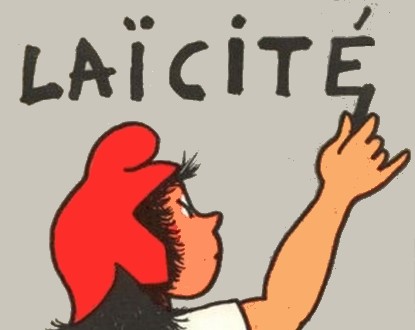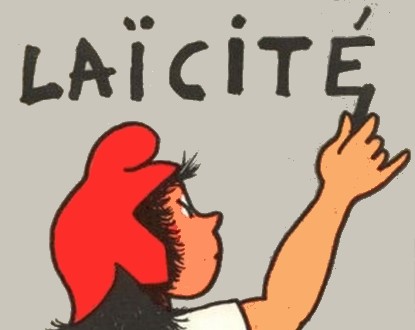When welcoming the new bishop of Nice on May 11, 2014, the President of the General Council of Alpes-Maritimes, Eric Ciotti, reiterated a statement he had already used in September 2013 and posted again on his Twitter account: “The principle of secularism guarantees freedom of worship but does not in any way forbid claiming & defending our Christian heritage.”
 However, it is necessary to differentiate between a person’s declarations in their own name, as an individual, and their statements as a political representative of a territorial community, and thereby of its constituents.
However, it is necessary to differentiate between a person’s declarations in their own name, as an individual, and their statements as a political representative of a territorial community, and thereby of its constituents.
As an individual, Eric Ciotti has every right to claim and defend a religious heritage; it is indeed the law of 1905, the separation of Church and State, that allows him to do so while safeguarding the freedom of worship within the respect of laws and public order.
Nonetheless, for Eric Ciotti, in his capacity as President of the General Council of Alpes-Maritimes, to publicly assert a religious heritage is contrary to the neutrality of public authorities, both national and local, regarding religion. Thus, this statement contradicts the principle of secularism.
Indeed, if secularism entails the freedom of worship for each individual within the law’s respect, it is precisely because the secular public space is a neutral space. Religious demonstrations occur there after authorization from local public authorities. This neutrality of the secular public space hinges on the neutrality of the public authorities themselves, who must not show any religious preference, whatever it may be. It concerns our coexistence within our “res publica,” the Republic being our common “thing” for all.
The President of the General Council must represent and treat all residents in his department equitably. Indicating a religious preference constitutes a public statement that is, if not exclusionary, at least exclusive.
While there has been long-standing debate over the “Christian roots of Europe” dear to Silvio Berlusconi and Nicolas Sarkozy, and the debate on the European elections shows that the difficult formation of the European Union as a major economic and political actor suffers from a weak sense of belonging and identification with Europe, the President of the General Council of Alpes-Maritimes sends an exclusive message instead of developing a discourse of inclusion and unity: He reminds us all, Christian or not, believers or not, that our department is a Christian land.
At the same time, Eric Ciotti argues against the removal of the General Council to avoid eliminating “identity links” (Twitter – May 13, 2014).
Once more, Eric Ciotti seems to deliberately maintain confusion: Eliminating the territorial community that is the General Council does not equate to eliminating the department as an administrative entity led by the State’s representative, which is the Prefect.
In two days, the President of the General Council claims a Christian heritage and defends “identity links” within the departments. But what identity links are these? What identity is being discussed here? Does he wish to reopen a debate on identity?
We have the right to expect a republican discourse from the representative of a territorial community, one that works toward unity and the involvement of all citizens for the common good, instead of a discourse that marks differences and identity claims.
We can hope, at the very least, for a President of a General Council to respect the strict neutrality of local public authorities in matters of religion.
This, Mr. Ciotti, is also what secularism entails.
David Nakache, federal secretary of the PS at the Lab des Idées



